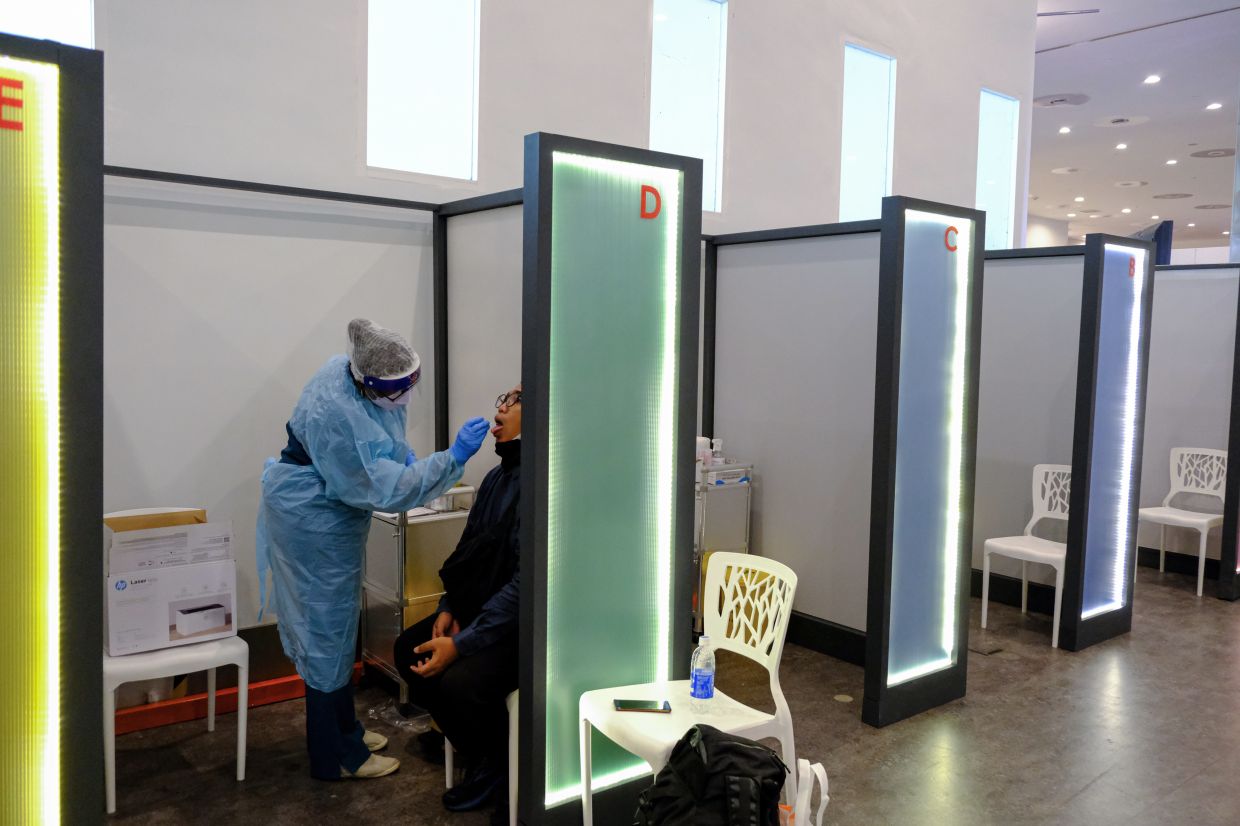
Opened borders: A health worker administering a test at a Covid-19 screening centre at KLIA2. Malaysia began to allow quarantine-free entry for fully vaccinated travellers from April 1. – Bloomberg
LET’S hope that the mandatory on-arrival antigen rapid test (RTK) at the Kuala Lumpur International Airport (KLIA) will be short-lived.
The issue is not the option of having to take the compulsory RTK tests at the airports or in health facilities within 48 hours, but its need in the first place.
It makes little sense to have this test because just prior to departure, a traveller entering Malaysia would be required to have a polymerase chain reaction test (PCR).
For example, a traveller flying in from London would need to do a PCR test at least 48 hours before departure, and the cheapest is about £65 (RM358) for the results to be delivered within 24 hours.
If you need your test results within three hours, it will be £85 (RM468), so, there’s no logic in conducting a test 14 hours later upon arrival at KLIA.
Then, you must pay for a professional RTK-Antigen (nasal) test costing RM100 for Malaysians and RM160 for foreigners.
Imagine short haul flights involving just a few hours, or like an hour, from Singapore.
It makes little sense to take two tests in such a short period for such a simple trip.
We’re all quite aware of the price of an RTK self-test kit at pharmacies, be it the nasal or saliva versions. There is an option, of course – you can take an RTK test at approved health facilities for about RM60, which provides results within 48 hours.
The PCR tests for incoming travellers are imposed by Malaysia. Britain no longer requires pre-departure PCR tests or on-arrival RTK tests. Singapore still insists on pre-departure PCR tests but has done away with on-arrival tests. Indonesia, Vietnam, Cambodia and the Philippines have either stopped it or announced that they will do likewise soon.
There should be greater flexibility for travellers because Malaysia has already declared it is transitioning into the endemic phase of Covid-19. Honestly, Malaysia should take the lead in Asean by making travel easier.
Many Malaysian business travellers heading to Singapore prefer making day trips because accommodation in the republic isn’t exactly peanuts. Throw in the cost of the numerous tests for each flight, and it all makes little economic sense to stay there. And remember, there are thousands of people commuting between the two countries on day trips.
It’s also questionable for a single company to handle screening services for all incoming travellers at KLIA and KLIA2. Proper tender exercises may have been conducted, but it’s still a monopoly.
Malaysia Airport Holdings Berhad announced that there are four different health screening providers at the four international airports – KLIA, Penang International Airport, Kota Kinabalu International Airport and Kuching Airport.
But there is only a single service provider at each one.
The tests have become pricey because the providers must pay for the set-up, rental and operations costs. Obviously, that will be passed on to the travellers. So, why the restriction for only a sole provider instead of encouraging competition?
The screening process can also be expedited when there’s more than one provider at the airports.
Another health provider has been able to offer the RTK test at RM60 for AirAsia passengers through an exclusive arrangement at KLIA2, which simply means that it can be cheaper.
AirAsia Malaysia chief executive officer Raid Asmat is right in saying that while it welcomed the reopening of international borders, many Asean countries have made the journey easier by simplifying testing regimes for travellers.
He said as Covid-19 tests become increasingly essential for travellers, the affordability of the mandatory testing would also harness the attractiveness of Malaysia as a preferred tourism destination.
So, how long must travellers put up with these on-arrival RTK tests when other countries have decided to be less cumbersome and, well, more competitive, by abandoning them?
Cynical Malaysians ailed by trust issues with the authorities could be forgiven for thinking that the compulsory RTK tests is just another cash cow, even though it’s not. However, it’s difficult to ignore this as a precautionary measure since Malaysia isn’t out of the woods, even if we’re almost in the endemic phase.
We haven’t even resolved the ownership controversy of the MySejathera app, even though Health Minister Khairy Jamaluddin has assured us that our data privacy is secure.
We need to keep Malaysia safe, but we also need to make our country competitive and stay ahead of the curve as borders are re-opened and the fight for tourism revenue accelerates.





